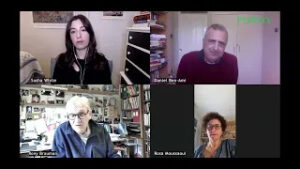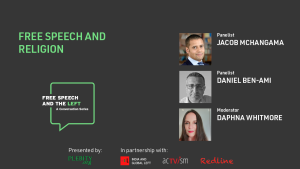
Before we can have an honest debate over what speech should be allowed and what speech should be forbidden, we need to confront a more basic question—who decides what we are allowed to say? As a society, we’ve handed over our right to make these decisions to a handful of tech lords and their money. We’ve allowed our most precious resource, our place of public discourse, to be privatized, and in so doing we’ve given up our ability to debate or even to understand the real issues of free speech and its necessary limits.
Free speech absolutism is a straw man argument
Critics of free speech often mockingly caricature proponents of free speech as ‘free speech absolutists’. Accusations of ‘free speech absolutism’ are a strawman argument. These critics are inventing and arguing against a position that very few people genuinely hold.
“This idea that we’re free speech absolutists is something that’s been invented by people who are against, who want to regulate speech in a way that is new and very repressive. “ –Matt Taibbi
The speech absolutist label is a distraction from the real debate. That debate needs to be about not whether but rather where we draw limits on allowable speech, who will decide what these limits should be, and most importantly of all, what role is there for us as citizens to genuinely discuss the issues and decide for ourselves?
It’s all online
In the past, concerns about free speech centered around government censorship and the power of the state. In the US, in spite of our first amendment, we do have a list of generally accepted limitations on free speech. We draw the line when it comes to defamation, harassment, imminent threats, child pornography and various other forms of speech. We have a somewhat transparent process for adjusting the boundaries of what is acceptable through a never-ending wrestling match of legislation and court challenges.
Today, our discourse is increasingly in the form of online interactions that take place on private platforms. There is no process comparable to the court challenges to the first amendment on the privately owned social networks where we speak, argue and exchange ideas. This sector is dominated by a small number of huge tech companies who answer to a small number of very powerful elites. These powerful few make all the decisions about what we are allowed to say through an unaccountable, invisible and arbitrary process.
Elinor Ostrom and the commons
Elinor Ostrom was a political economist who received her PhD from UCLA in 1965. She received a Nobel Prize for Economics in 2009 for her work on what is known as the commons.
The commons are the parts of our world, cultural or physical, that are shared by everyone in a society. They may be grazing land, fishing grounds, irrigation systems, drinking water or other resources. In a just society the commons would include free education and universal healthcare.
Ostrom sought to understand why some commons succeed while many, if not most, fail. She studied examples of successful commons throughout the word, including Africa, Nepal, Japan, the United Kingdom and the U.S.
One successful example that interested her is an agricultural commons called North Meadow in the U.K. which has lasted for hundreds of years.
“[North Meadow]… is a traditionally managed lowland hay-meadow, or lammas land, and is grazed in common between 12 August and 12 February each year, and cut for hay no earlier than 1 July. This pattern of land use and management has existed for many centuries and has resulted in the species rich grassland flora and fauna present on the site” – Wikipedia
Drawing from her studies, Ostrom rejected the prevailing argument of the time that the commons were hardwired to fail. That view was labeled ‘the tragedy of the commons’ by Garret Hardin, a biologist who wrote an influential article by that name in 1968. Hardin argued that in a grazing commons where different herds share pasture, it is rational for every herdsman to keep adding to the size of his own herd. Acting on this rational self-interest creates a downward spiral as each member seeks to maximize their own benefits. It becomes inevitable that the commons then become overused and unsustainable.
Ostrom rejected this zero sum view that predicted inevitable failure for the commons. For Ostrom it was important to distinguish between common resources and common ownership. Common resources might be forests or fishing grounds that are used collectively but where the users do not have ownership. When the users own the resources in common the dynamic changes. The users have a stake in the sustainability of the resource. In this context rational self interest can give way to a cooperative ethic where the benefits of maintaining the resource rather than using it up are understood by everyone.
A successful commons requires an agreed upon set of rules
The key condition for achieving a successful commons, according to Ostrom, is the development of trust. Fostering trust requires adopting rules that all members have agreed on. Trust only develops when the rules are decided upon through a democratic and transparent process. In a successful commons the rules cannot be arbitrarily imposed from above by a central authority.
Everyone involved in the commons needs to feel they have a stake in its success and that the rules are equally binding on everyone. Ostrom observed that when the rules for a commons were decided in a truly democratic fashion this could set off a virtuous cycle that encourages and rewards voluntary cooperation.
“Once we start seeing a variety of different forms of governance and economic institutions, we are open to the possibility of alternatives that could potentially transform social and economic reality in a positive direction.” – Elinor Ostrom’s Rules for Radicals
The public square where we meet and speak must be a collectively owned resource
In our society, we barely recognize the term ‘commons’. The idea of collective control and ownership is unfamiliar to us in our neo-liberal world where everything has been privatized.
In a society where top-down rules are standard, we have little or no experience of how to build democratic self-governing structures that work” – Elinor Ostrom’s Rules for Radicals
Today our public square is owned and managed by a feudal coterie of tech lords. Their arbitrary and self-interested rule has transformed our public square into a toxic cesspit.
Free speech decisions on social networks are guided by an unknown mesh of personal predilections of tech company CEOs and their boards. They are driven by profit motive and the competition of rivals. The algorithms that enforce their censorship are based on rules that we know nothing about; we haven’t participated in their design or voted on their adoption.
“The commons fail, ultimately, because distrust leads to a lack of cooperation. The ‘tragedy’ is based on the formal models like the prisoner’s dilemma that suggest that competitive behavior will win out over cooperation and the commons will be destroyed.” –Derek Wall author of Elinor Ostrom’s Rules for Radicals
There will always be a need to find a balance between the possible harms of speech and the rights of everyone to speak and hear all sides of an issue. Unfortunately, the increasingly popular argument on the left that offensive speech is literal violence shuts down any good faith debate. All of us as citizens, regardless of our political bias, must come together to confront not only the question as to where the lines of allowable speech need to be drawn, but what will be the process for deciding and enforcing those lines. The goal is not to seek a perfect solution, which in any case doesn’t exist. The goal is to develop an environment where everyone shares an interest in arriving at a working process that is transparent and sustainable.
Critics of the commons point to the problem of ‘free riders’ who take advantage of the resource and use it up. On social media that weak link is easily identifiable–the troll. The troll is the harasser or online bully who seeks to provoke reaction and renders the environment unbearable for the majority. Trolling is rampant behavior on social media where users have no ownership of the resource and therefore no stake in preserving a healthy public space. They range freely, and often anonymously and make it impossible to develop the trust that is essential to the well being of the commons.
The digital spaces are designed to reinforce this toxic behavior with all the beeps and hearts that have been so carefully developed. Everyone can be lured into being a troll.
We must find a way to change this system that rewards destructive behavior. A basic standard of online cooperation needn’t be complicated. Concretely, we need to recognize that all opinions need to be heard but also understand that criticizing ideas is not the same as attacking individuals. In our real world interactions as adults we are usually able to make this distinction.
Why have we given away our commons? Where is our citizen’s debate on speech and the limits we must impose?
Recently, a number of alternative platforms have developed in response to the censorship of the major tech companies.
Although there are some genuine alternative softwares that deserve support, switching platforms to Rumble or Truth Social is a false choice, no more than a substitution of one master for another. There must be a people’s version of every social media platform. We can’t settle for Potemkin imitations built by conservative billionaires.
There will be no true free speech until the employees of the digital public square and the citizens who gather there reclaim their ownership. We need a coup against Silicon Valley and everything that it represents.
Reclaiming our public space means reclaiming our dignity and rights as citizens. For human society, and particularly from any leftist perspective that aspires to a better society built on cooperation and solidarity, we need to recognize how precious this commons is that we have given up.
The tech platforms only thrive because we have allowed them to lure us into captivity. But their power only lasts as long as we continue to grant it. It’s in our hands to take it away as well.



